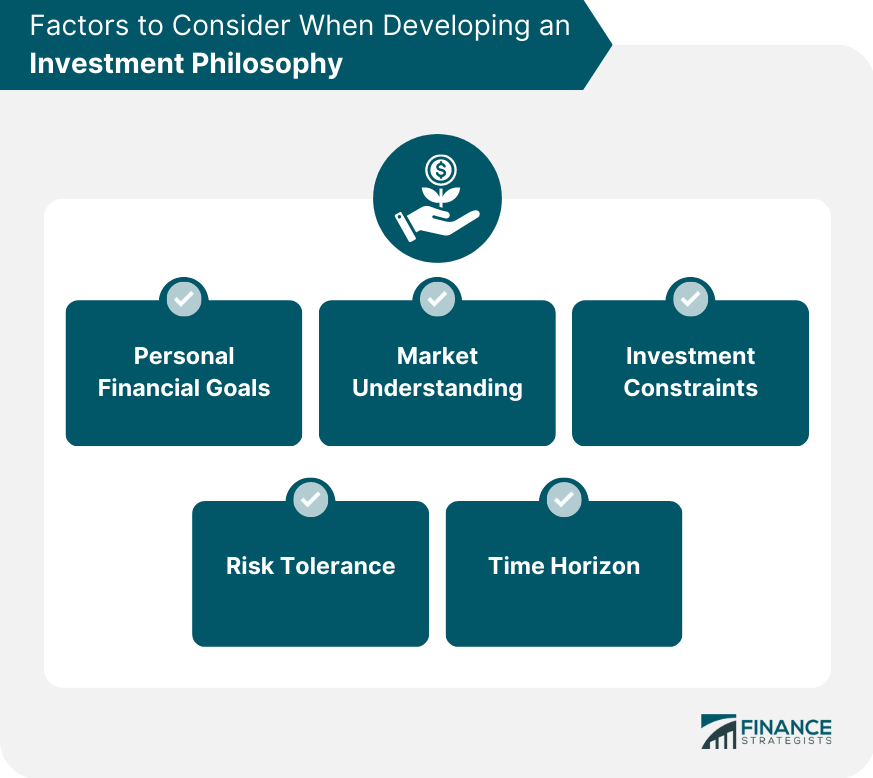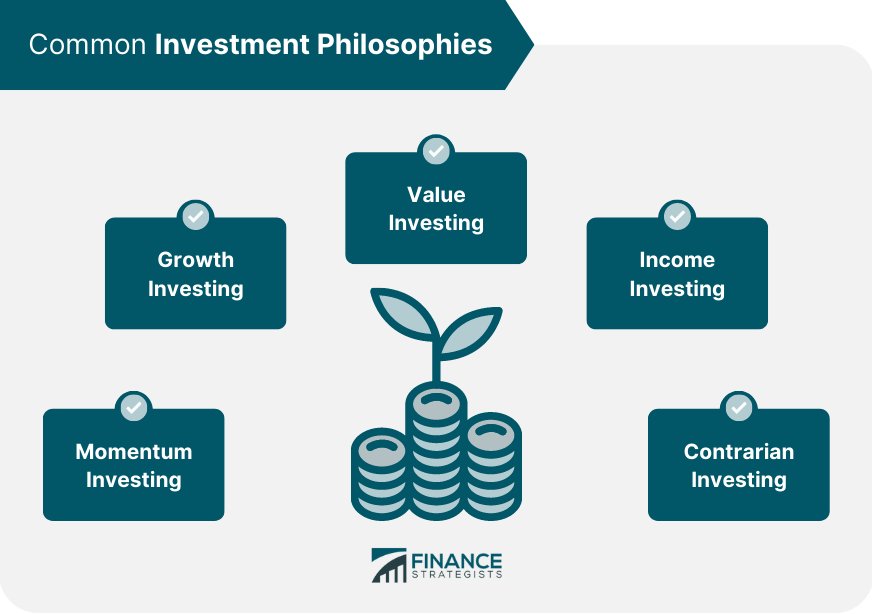Investment philosophy is a set of guiding principles and beliefs that shape an investor's approach to selecting and managing investments. It provides a framework for making informed decisions based on an individual's financial goals, risk tolerance, and time horizon. Investors' financial objectives, such as retirement savings, education funding, or purchasing a home, should influence their investment philosophy. The goals should be specific, measurable, and realistic to guide decision-making and provide a clear path to success. Risk tolerance refers to an investor's ability to withstand fluctuations in the value of their investments. Investors should determine their risk tolerance based on factors such as their age, financial situation, and investment objectives. The investment time horizon is the length of time an investor plans to hold their investments before needing the funds. A longer time horizon generally allows for more aggressive investment strategies, while shorter time horizons necessitate a more conservative approach. Investors should have a solid understanding of the financial markets, asset classes, and investment strategies. This knowledge will help them make informed decisions and develop a well-rounded investment philosophy. Individual investors may face various constraints, such as liquidity needs, tax considerations, and legal restrictions. These constraints should be considered when developing an investment philosophy to ensure that it remains practical and achievable. Value investing is a long-term investment strategy that seeks to identify undervalued stocks with strong fundamentals. Investors who follow this philosophy believe that the market often misprices securities, creating opportunities for profit. Below are the principles involved in value investing. Focus On Intrinsic Value: Value investors analyze financial statements and other fundamental data to determine a company's intrinsic value and compare it to the current market price. Margin of Safety: Value investors seek to purchase stocks at a discount to their intrinsic value, providing a margin of safety in case the market's assessment is incorrect. Long-Term Focus: Value investing requires patience, as it may take time for the market to recognize a stock's true value. Prominent value investors include Benjamin Graham, known as the "father of value investing," and his famous disciple, Warren Buffet. Advantages of value investing include the potential for high returns and lower risk due to the margin of safety. Disadvantages include the possibility of value traps, where a stock appears undervalued but has underlying issues that prevent its price from appreciating. Growth investing is an investment strategy focusing on companies with high growth potential, aiming to capitalize on the stock's appreciation as the company expands and generates higher revenues. Below are the principles involved in Growth Investing: Focus On Growth Prospects: Growth investors prioritize a company's future growth potential over its current valuation. Earnings and Revenue Growth: Growth investors look for companies with consistent and above-average earnings and revenue growth. Market Leadership: Growth investors often favor companies with a strong competitive position in their industry. Advantages of growth investing include the potential for high returns and the ability to capitalize on innovative companies. Disadvantages include the higher risk associated with growth stocks and the potential for overvaluation. Income investing is a strategy that seeks to generate a steady stream of income through dividends, interest payments, and other income-producing assets. Below are the principles involved in Income Investing: Focus On Income-Producing Assets: Income investors prioritize assets that generate regular income, such as dividend-paying stocks, bonds, and real estate investment trusts (REITs). Stability and Consistency: Income investors seek investments that provide reliable and consistent income streams, even in volatile market conditions. Yield and Total Return: A focus on both yield and total return is essential for income investors to balance current income generation with potential capital appreciation. Some common income-producing assets include: Dividend-paying stocks Bonds (government, corporate, and municipal) Real estate investment trusts Master limited partnerships (MLPs) Preferred stocks Annuities Advantages of income investing include providing a steady income stream and the potential for lower risk compared to growth-oriented strategies. Disadvantages include the possibility of lower overall returns and the impact of rising interest rates on income-producing assets. Momentum investing is a strategy that involves buying stocks that have recently performed well and selling those that have underperformed. Investors following this philosophy believe that trends tend to persist, and they can profit from this momentum. Below are the principles involved in Momentum Investing: Price Trends: Momentum investors focus on price trends, believing that stocks with strong recent performance are likely to continue outperforming. Relative Strength: A stock's performance relative to the overall market or its sector is a key consideration for momentum investors. Technical Analysis: Momentum investors often rely on technical analysis tools, such as moving averages and relative strength indicators, to identify trends and entry and exit points. Advantages of momentum investing include the potential for high returns and the ability to capitalize on market trends. Disadvantages include the risk of trend reversals, overvaluation, and higher trading costs due to frequent transactions. Contrarian investing is a strategy that involves taking positions that are contrary to the prevailing market sentiment. Contrarian investors believe that markets often overreact, creating opportunities to profit from mispriced assets. Below are the principles involved in Contrarian Investing: Market Sentiment: Contrarian investors monitor market sentiment to identify periods of extreme optimism or pessimism. Mean Reversion: Contrarian investors believe that asset prices tend to revert to their long-term averages over time. Value Identification: Like value investors, contrarian investors search for undervalued assets with strong fundamentals. Advantages of contrarian investing include the potential for high returns and the ability to capitalize on market inefficiencies. Disadvantages include the risk of mistiming market turns and the possibility of value traps. Investors can apply their investment philosophies using asset allocation strategies. Diversification is a risk management technique that involves investing in a variety of assets to reduce portfolio risk. A well-diversified portfolio can help mitigate the impact of individual asset price fluctuations. Strategic asset allocation is a long-term approach to portfolio management that involves setting target allocations for different asset classes based on an investor's financial goals, risk tolerance, and time horizon. This approach often involves periodic rebalancing to maintain the target allocations. Tactical asset allocation is a more active approach to portfolio management that involves adjusting asset allocations based on short-term market conditions and investment opportunities. This approach seeks to take advantage of market inefficiencies and trends while still maintaining a long-term strategic allocation. The core-satellite approach combines elements of both strategic and tactical asset allocation. In this approach, the core portfolio is invested in broadly diversified, low-cost index funds or ETFs, while the satellite portion is dedicated to more actively managed investments or specialized strategies to enhance returns and diversification. Investment Philosophies can also be applied in Portfolio Construction and Management: Security selection involves choosing individual investments that align with an investor's investment philosophy, goals, and risk tolerance. This process may involve fundamental analysis, technical analysis, or a combination of both approaches. Portfolio rebalancing is the process of adjusting an investor's portfolio to maintain the target asset allocation. Rebalancing can help control portfolio risk and ensure the portfolio remains aligned with the investor's financial objectives. Investors should regularly monitor their portfolio's performance to assess whether their investment philosophy and strategy are producing the desired results. This may involve reviewing performance reports, benchmark comparisons, and risk metrics. Tax-efficient investing involves considering the tax implications of investment decisions to minimize the investor's tax liability. This may include selecting tax-efficient investments, strategically managing capital gains and losses, and utilizing tax-advantaged accounts. Investors should periodically review and refine their investment philosophy based on changing market conditions, personal circumstances, and financial objectives. This may involve adjusting risk tolerance, time horizon, or investment strategies to better align with current needs and goals. Investors can incorporate ethical considerations into their investment philosophy by: Defining Personal Values and Priorities: Determine which ethical issues are most important to you and how they align with your financial goals. Researching Investments: Evaluate potential investments based on their ESG performance and alignment with your values. Diversifying Your Portfolio: Ensure that your ethical investments are well-diversified across different sectors and asset classes to manage risk. Monitoring Performance: Regularly review your portfolio's ethical and financial performance to ensure it remains aligned with your objectives. A well-defined investment philosophy is essential for making informed and consistent investment decisions. By considering factors such as personal financial goals, risk tolerance, and time horizon, investors can develop a tailored investment philosophy that aligns with their unique needs and preferences. Regularly reviewing and refining this philosophy will help investors adapt to changing market conditions and personal circumstances, ensuring continued progress toward their financial objectives.What Is Investment Philosophy?
Factors to Consider When Developing an Investment Philosophy
Personal Financial Goals
Risk Tolerance
A well-defined investment philosophy should reflect this risk tolerance, guiding the selection of appropriate assets and strategies.Time Horizon
Market Understanding
Investment Constraints

Common Investment Philosophies
Value Investing
Growth Investing
Income Investing
This investment philosophy is often favored by conservative investors, such as retirees, who prioritize income generation over capital appreciation.Momentum Investing
Contrarian Investing

Using Asset Allocation Strategies to Apply an Investment Philosophy
Diversification
Strategic Asset Allocation
Tactical Asset Allocation
Core-Satellite Approach
Applying an Investment Philosophy in Portfolio Construction and Management
Security Selection
Portfolio Rebalancing
Monitoring Performance
Incorporating Tax Efficiency
Adjusting Investment Philosophy Based on Changing Circumstances
How to Incorporate Ethical Considerations into an Investment Philosophy
Conclusion
Investment Philosophy FAQs
Investment Philosophy is a set of principles and beliefs that guide an investor's decision-making process when selecting investments. It defines the investor's approach to risk management, portfolio diversification, and asset allocation.
Investment Philosophy is crucial because it provides a framework for making investment decisions based on a set of principles that align with an investor's goals, risk tolerance, and beliefs. It helps investors stay disciplined and avoid making impulsive decisions based on emotions or market trends.
There are several types of Investment Philosophies, including value investing, growth investing, income investing, momentum investing, and index investing. Each philosophy has its own set of principles and strategies that are used to select investments.
Developing an Investment Philosophy involves defining your investment goals, understanding your risk tolerance, and identifying your core investment beliefs. You may also need to research different investment strategies and asset classes to determine what aligns with your investment goals.
Yes, an Investment Philosophy can change over time as an investor's goals, risk tolerance, or market conditions evolve. It's important to periodically review and update your Investment Philosophy to ensure it continues aligning with your goals and beliefs.
True Tamplin is a published author, public speaker, CEO of UpDigital, and founder of Finance Strategists.
True is a Certified Educator in Personal Finance (CEPF®), author of The Handy Financial Ratios Guide, a member of the Society for Advancing Business Editing and Writing, contributes to his financial education site, Finance Strategists, and has spoken to various financial communities such as the CFA Institute, as well as university students like his Alma mater, Biola University, where he received a bachelor of science in business and data analytics.
To learn more about True, visit his personal website or view his author profiles on Amazon, Nasdaq and Forbes.















